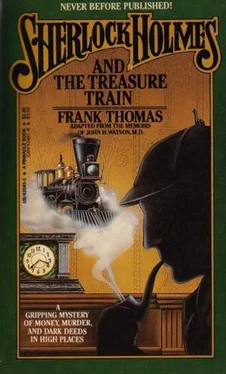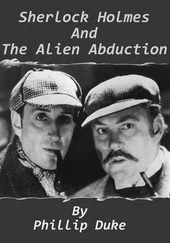Holmes had dispatched a cable from Shaw alerting Mrs. Hudson to our time of arrival, as was his custom. This thoughtfulness proved of value. As we alighted from our hansom, Billy was, again, awaiting our arrival. Taking our valises, the page boy informed us that a visitor was, even now, in our chambers. Billy had developed an instinct for such things and brushed off our topcoats before we ascended the seventeen steps to our first-floor sitting room.
It was Claymore Frisbee who sat in the client's chair when Billy ushered us into our chambers. The president of Inter-Ocean Trust had had dealings with the great sleuth before and good reason to consult with him when troubled.
After cordial greetings and a minimum of small talk, Frisbee accepted my offer of liquid refreshment and got to the matter at hand. "It is this gold bullion robbery, Holmes."
My friend's good-natured expression was promptly erased. Before he could comment, Frisbee beat him to the punch, no mean feat.
"I know of your meeting with Chasseur, but hear me out. You have to, you know," added the banker with a smile.
Curiosity struggled with the hauteur in Holmes' manner. "How so?"
"Have I not heard you say that to prejudge is the mark of a fool?"
Suddenly the sleuth chortled, something he did more often than people thought. "You have me there. Hoist on mine own petard. Let's hear your tale."
Holmes stirred up the fire in the grate with the poker and then seated himself in the cane-backed chair, his long, sensitive fingers steepled together and his manner that of cordial attention.
"A special train of the Birmingham and Northern was routed to Great Yarmouth with a load of gold bullion to be shipped to France," stated the banker, accepting a glass from me. Knowing Holmes' habit of devouring the daily journals, he added, "I'm sure you're aware of the basic facts."
"Let us benefit by complete coverage," suggested Holmes, "including your involvement."
"I'll get to that," replied the banker. "There was half a million pounds on the B & N flyer and the line took elaborate precautions, but the robbery caught them by surprise."
Frisbee must have sensed a thought in Holmes' mind, for he paused in his narration and the sleuth did fill the void. "I can't see why. Of all the articles of value used as a means of exchange, gold is the most anonymous. It lacks the serial numbers of currency and is devoid of geographical characteristics." My eyebrows must have elevated and the sleuth elaborated. "Gold mined in Australia or Russia is not a smidgen different from that found in Canada, the United States, or Africa. Nor does it matter how it is secured. Mined gold, panned gold, hydraulic gold, flotation gold; it is all the same. What surprises me is that more attempts are not made to steal it."
"Well, it is a mite heavy," said Frisbee, "and not available in large quantities outside of bank vaults."
"It was in this case," I said, taking my drink to the settee.
"An unusual situation," conceded the banker. "The precious metal was to be shipped to the Credit Lyonnais in France. They have an issue of gold-bearing bonds coming due, and ever since their unfortunate investment in that Netherlands-Sumatra swindle, there has been talk about their solidarity. The financial firm anticipated a considerable run on the bonds at due date with demands for payment in gold, so they strengthened their reserves by arranging a loan from a syndicate of our west coast banks that were well supplied. The metal was shipped to London from the banks involved and then placed upon the B & N special train. The B & N now employs one Richard Ledger for matters of this sort."
"I don't know his record," interjected Holmes.
"Former army. Service in India. He sold his commission and was taken on by the Kimberly interests as a security man. Comes well recommended. Ledger planned the shipment rather like a military campaign. He arranged for the flyer to make the run from London to Great Yarmouth nonstop. He had a solo locomotive out ahead of the train to prevent tampering with the tracks."
"With a means of communication should the advance engine come upon something, I assume," said Holmes, his attention definitely caught at this point in the story.
"A signal rocket," said Frisbee. "The treasure train consisted of an engine and two boxcars, with the gold in the second one, though that was a carefully guarded secret. On the roof of the first boxcar, Ledger had constructed a miniature block house with steel plating on the outside and slotted windows. Not a large affair, since he had to figure bridge clearances, but serviceable. In it he had four marksmen whom he trained himself. Ledger has a considerable reputation as a dead shot."
"So we were told," I commented, and then wondered why I had spoken at all.
The banker continued: "The marksmen had an uninterrupted view of the sides and rear of the train, and Ledger stated that it was impossible for anyone to board the flyer once she was under way."
"A miscalculation, it would seem," said Holmes in a thoughtful manner. "These riflemen could not see the rear of the train from their fortified position, I would judge."
"No," replied Frisbee, "but the flyer never traveled at less than thirty miles per hour once clear of the B & N yards. To get to the rear of the second boxcar, hijackers would have had to approach from one side of the track or the other and been plainly visible."
"The entire trip being made during daylight?" I queried.
"It was planned that way."
Holmes rose suddenly and took a turn around the room, going over the matter with his quicksilver mind. Then he returned to the mantle and gazed moodily into the hearth fire. "You might well take a shot at the newspaper game should banking ever bore you. You've described the matter far better than the journals."
"With more information," replied Frisbee modestly.
"What happened?" I asked, on tenterhooks.
"The bullion train was two hours outside of London and on an upgrade when suddenly smoke bombs were thrust through the slits in the riflemen's cubicle. They were blinded by the fumes and so choked that they could not even shout for help."
"And there being but one exit from their position, they were trapped within." The banker nodded in agreement with Holmes' remark, and the sleuth threw me a glance.
"Static warfare. Ineffective in modern times, Watson. The old feudal castles served their purpose but are antiquated now as is the entire enclave theory."
"But we're not discussing a military campaign," I remonstrated.
"The defense of the train was planned like one, and I would say the robbery had overtones of army tactics as well. In any case, we have the guard hors de combat momentarily . . ." Holmes turned suddenly toward Frisbee. "Was there any attempt to eliminate the riflemen?"
"None," replied the banker. "Whoever used the smoke bombs, and it had to be more than one person, effectively jammed the half-door leading into the armored cubicle and went about their business."
"Which was?" queried Holmes.
"They disengaged the rear boxcar from the train."
"You mentioned that this happened on an upgrade. The train continued up the slope and the boxcar rolled back down the track in the opposite direction."
"Fiendishly clever, wasn't it?" said Frisbee. "At the foot of the grade there was a stretch of level ground and an unused spur line. The boxcar rolled along until it came to the spur, which the thieves had switched. It then followed the feeder track until it came to a stop of its own volition some distance from the main line. There were marks of a wagon and horses there, and obviously they transferred the gold from the boxcar and made their escape."
"Aided, I judge," mused Holmes, "by the fact that it took some time to discover how they made use of the abandoned spur line."
Читать дальше












